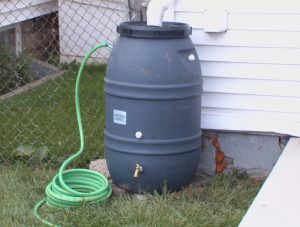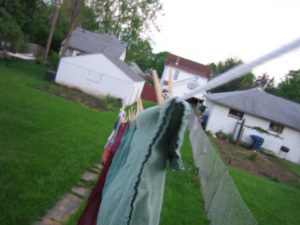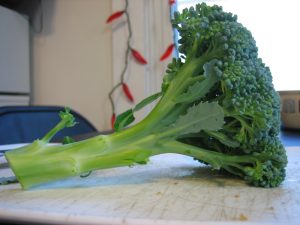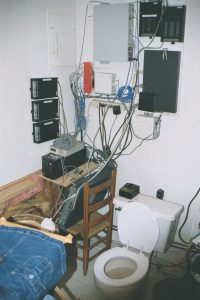I'm on a paid vacation right now. For those of you who don't already know, this means my employer, Summersault, is actually paying me to not show up to the office for a while. Ha - suckers! Apparently it's pretty normal for employers around the world to offer some sort of paid "break" from the expectations that normally come with the job - showing up, getting stuff done, etc. - in the name of rejuvenating oneself, catching up, getting rest, exploring the world, spending more time with family, and so on. But I thought I might take a few ironic moments to suggest that this practice of paying people to go on vacation is a rather silly one, at least in the context of the larger effort to create the lives we want for ourselves.
Continue reading "Vacation and Vocation"
Tag: culture
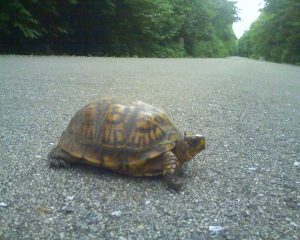 There's some real vitriol out there in "letter to the editor" land, especially here in Richmond. In the Palladium-Item, we like to play the game "How Many People Can You Insult in 300 Words or Less?" sometimes also known as "The Wheel of Not So Subtle Discrimination and Hate-mongering!" Today's contestant is Paul M. Yevcak who says that "hypocrisy proves middle name for liberal Democrats."
There's some real vitriol out there in "letter to the editor" land, especially here in Richmond. In the Palladium-Item, we like to play the game "How Many People Can You Insult in 300 Words or Less?" sometimes also known as "The Wheel of Not So Subtle Discrimination and Hate-mongering!" Today's contestant is Paul M. Yevcak who says that "hypocrisy proves middle name for liberal Democrats."
My response, posted in the forums (despite my better judgement):
It would be possible to debate some of Mr. Yevcak's points related to the role of the courts, the history and nuances of U.S. immigration policy, and the legal technicalities of the recent presidential intervention in the Libby case. But I'm not sure what purpose that would serve, since Mr. Yevcak seems intent not on having meaningful debate or dialogue, but just on disparaging and insulting a wide swath of people, essentially on the grounds that they don't agree with him about how the world should work. And of course, when that is someone's goal, you can't really have a meaningful conversation with them.
Continue reading "The haters are writing in, what are you doing?"
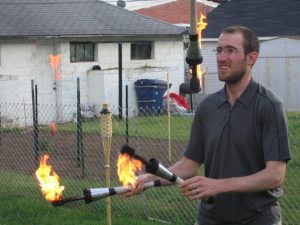 These numbers came into my inbox today:
These numbers came into my inbox today:
- Number of US citizens (non-military) killed by terrorists in 2005: 56
- Amount spent by US government on War on Terror in 2005: $136 billion
- Number of people worldwide who died of hunger in 2005: 8,000,000
- Amount spent by US government on aid to world's poor in 2005: $4.9 billion
(Sources: US Dept. of State; The End of Poverty; Congressional Research
Service)
When I was in College, where I learned that world-views which can be expressed on hip bumper stickers are the ones you really want to internalize and live by, I saw one that said "If you're not outraged, you're not paying attention." I really liked it at the time, because it highlighted the curious and nearly universal practice of going about our daily lives while really awful, horrible, disgusting things are happening all around us.
Continue reading "On being outraged and paying attention"
 I have a lot of memories of visiting zoos as a younger person. There was the time my Boy Scout troop had an overnight stay at the Cincinnati Zoo, where we had behind-the-scenes tours of the habitats and infrastructure that made up the place; I was amazed at the intricate facades created for zoo visitors. Another summer at the same zoo and I'm about to start drinking my red cream soda during a field trip lunch break, when a bird poops directly into it from a tree overhead. I remember feeling frustration and resentment that this creature had invaded my personal space so - now I laugh at the irony of that resentment, felt so strongly against one who was just answering the call of this artificial shrine to come observe animal life, poop and all. And most recently, standing with my nose and right hand pressed up against the glass at the Lincoln Park Zoo in Chicago, apologizing to the once-grand and beautiful Gorillas on display there for the noisy people, the cheesy layout of the captivity, the life stolen from them. "I'm so sorry," I mouthed. "Please forgive us."
I have a lot of memories of visiting zoos as a younger person. There was the time my Boy Scout troop had an overnight stay at the Cincinnati Zoo, where we had behind-the-scenes tours of the habitats and infrastructure that made up the place; I was amazed at the intricate facades created for zoo visitors. Another summer at the same zoo and I'm about to start drinking my red cream soda during a field trip lunch break, when a bird poops directly into it from a tree overhead. I remember feeling frustration and resentment that this creature had invaded my personal space so - now I laugh at the irony of that resentment, felt so strongly against one who was just answering the call of this artificial shrine to come observe animal life, poop and all. And most recently, standing with my nose and right hand pressed up against the glass at the Lincoln Park Zoo in Chicago, apologizing to the once-grand and beautiful Gorillas on display there for the noisy people, the cheesy layout of the captivity, the life stolen from them. "I'm so sorry," I mouthed. "Please forgive us."
I've had plenty of conversations about why most zoos maybe aren't such a good thing, about what they symbolize, what they mean about who we are as a people and a culture. But until I read Thought to Exist in the Wild: Awakening from the Nightmare of Zoos by Derrick Jensen and with photography by Karen Tweedy-Holmes, I hadn't really explored that symbolism and sense of concern in any depth. And to that end, the book is a thought-provoking and eye-opening treatment of the subject.
Continue reading "Derrick Jensen's Thought to Exist in the Wild"
I remember going to renew my car registration at the Indiana BMV several years ago, and in a moment of vanity, asking about getting one of those personalized license plates. I was thinking maybe "SUMSALT" or "WEBPRO" or "TALLGY" or the like. But when they said it would be at least an extra $40 because of the costs of producing the special plates, I decided this was an area of my life where I was perfectly fine being just another number in the system. I guess I understood that it cost the state extra dollars to produce those plates, I just didn't want to pay for it.
I was surprised and disturbed today to learn that there's one kind of custom/special license plate you can get in Indiana at no extra charge.
Continue reading "I'm Funding Indiana "In God We Trust" License Plates"
Presenting: another epic saga of wireless phone company incompetence...bear with me.
I'd had my Sprint cell phone and plan since 2001 - six years of relatively problem free operation (minor billing annoyances aside). And they recognized that I was a loyal customer who always paid my bill on time - in recent years they regularly sent me offers to "upgrade my plan" or my phone and receive a billing credit (but we all know this is because they wanted me to renew my vows and sign on to a new contract).
Recently, I decided that I wanted to look at a phone upgrade. 6 years had taken its toll on my Samsung A500, and I was excited about the possibility of a phone that would better sync up its contacts and calendar with my computer. I had asked Slashdot about such a product a few years ago, but the offerings were much more promising now.
Continue reading "Is it possible for Sprint customer service to be this bad?"
At lunch today we were talking about all the social networking sites that have popped up on the Intertubes over the recent years. Mark and I sounded a little curmudgeonly about it, noting that we've long since been ignoring invitations to join the latest fad in making virtual connections to the rest of the world. First I was on BBSes back in the day. They I joined some mailing lists. Then there was Friendster, which kept losing my profile and whose software sucked. And then there was Orkut, which I signed up for because it was Googly but I wasn't popular enough to do anything useful with. And that's when I sort of gave up. MySpace, Facebook, LiveJournal, Linked In and all the rest can call me or send a representative to do lunch if they really want me. Except Myspace - puke.
Part of it is probably the sense that I'd rather be spending time strengthening ties in my real-world community than in an online one. Another part is just not caring. But most importantly, it seems the trend is such that soon we'll have one social networking site per each person with an Internet connection, and we'll be back where we started. I've got enough passwords to remember as it is, okay?
But it is funny to me when the networking sites scrape information off of my website in an attempt to make me look like a member. Like Spoke, which just did this without asking. Unfortunately, they get some significant things wrong, e.g. listing Earlham College President Doug Bennett as the president of my company, Summersault. To be clear, Doug has not left his position as the president of an internationally known liberal arts college to serve as President of a website development firm.
If he is looking for that kind of position with us, we're open to, um, networking with him...without the help of a website.
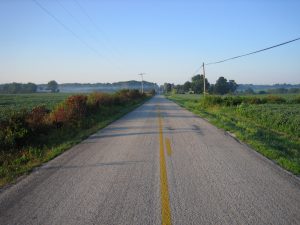 During the Third U.S. Conference on Peak Oil and Community Solutions that I attended last month, I found myself surrounded by an amazing group of hundreds of people who were trying to make changes in the world to move us (the human species) toward sustainability. While I do not limit my thinking on sustainability to the slogan "be the change you want to see in the world" (article on that is forthcoming), I thought it might be useful to take an inventory of the things I'm doing in my own life to reduce my impact on the world and my resource usage in our culture. I also thought it would be important to start to list the areas where I still need to make progress.
During the Third U.S. Conference on Peak Oil and Community Solutions that I attended last month, I found myself surrounded by an amazing group of hundreds of people who were trying to make changes in the world to move us (the human species) toward sustainability. While I do not limit my thinking on sustainability to the slogan "be the change you want to see in the world" (article on that is forthcoming), I thought it might be useful to take an inventory of the things I'm doing in my own life to reduce my impact on the world and my resource usage in our culture. I also thought it would be important to start to list the areas where I still need to make progress.
I don't publish this information as any sort of prescription for anyone else; there are millions of ways to make changes in our lives to do less harm, and not all of them look anything like the below (and some of them contradict the below), so I fully respect that this is what works for me as I experiment, and it may not work for anyone else. There is no one right way to be more sustainable. However, if you find this list useful, or have suggestions or feedback on it, I hope you'll contact me to let me know.
Things I do in my life to reduce my unsustainable resource usage:
- I've created, participate in and financially support multiple community-oriented programs that promote and educate others around messages related to sustainability.
 I have a rain barrel in my yard to collect rainwater for use in gardening and yard work. It reduces the amount of filtered and treated city water I use by just a little bit, but rainwater is also better for my plants.
I have a rain barrel in my yard to collect rainwater for use in gardening and yard work. It reduces the amount of filtered and treated city water I use by just a little bit, but rainwater is also better for my plants.- I mow my yard less than neighborly convention might dictate. I'm working on using a scythe to replace my gas-powered mower (and increase my physical exercise!).
- I replaced the old drafty windows in my house with newer and more sealed ones. This helps reduce the energy needed to keep me comfortable inside. Unfortunately, the replacement windows are made up significantly of petroleum-based products.
- I had a super high-efficiency furnace installed in my house.
- I don't use air conditioning at my house more than 3 or 4 days per year, and use ceiling fans, window shading, and other methods instead. (I do, however, work in an air-conditioned office, so I can't claim to be braving the heat every day.)
- I live in a small town that is easy to get around, has the potential for great community-building, and has a heritage that involves peace and justice, sustainable agriculture and entrepreneurial solutions to difficult problems.
- I've replaced all of the conventional incandescent light bulbs in my house with compact fluorescent bulbs. These are supposed to last much longer and use much less energy.
- I wash my dishes by hand.
- I purchased a high-efficiency front-loading washing machine
 I also purchased a high-efficiency drier, but there really isn't such a thing, so I try to use a clothesline to dry my laundry in the sun when I can.
I also purchased a high-efficiency drier, but there really isn't such a thing, so I try to use a clothesline to dry my laundry in the sun when I can.- I have been working on putting my appliances that use phantom power on power strips that I can turn off when I'm not using them.
- I participate in my city's recycling program
- I compost all organic waste from my cooking and store it in the big compost bin next to my garden.
- I try to buy goods and services from local businesses when possible. This reduces the amount of resources required to bring those items to me, and supports a strong local economy that can be more resilient to fluctuations in energy prices. I especially try not to buy goods and services from businesses that I feel are actively harming local/regional/national natural resources, engaging in slave labor, or participating in the cultural trends toward sacrificing our planet and its lifeforms in the name of increased consumerism.
- I support my local food cooperative by volunteering and serving on their board of directors, and by ordering household staples in bulk from them.
- I try to avoid eating food that will poison my body and potentially increase the resources needed to keep me healthy (now or in the future)
- I avoid buying new products and clothing when I can find them in like-new condition by shopping at Goodwill or the Salvation Army.
- I have installed or am installing low-flow shower heads in my showers.
- I avoid using household chemical products that pollute and cause medical problems
- I ride my bicycle when I have time. Having time to ride a bike is a relative/subjective/complex thing, so I'm working on ways to make more time for riding instead of driving.
- I walk places when I have time. Having time to walk is a relative/subjective/complex thing, so I'm working on ways to make more time for walking.
- When I do drive, I drive a car that gets reasonably high gas mileage (i.e. not an SUV) and I try to minimize my trips.
 I have a garden where I sometimes grow my own food instead of buying it from retailers who have produced it with a variety of chemicals, packaged it with a variety of non-reusable materials, and shipped it from all around the world using a variety of petroleum resources.
I have a garden where I sometimes grow my own food instead of buying it from retailers who have produced it with a variety of chemicals, packaged it with a variety of non-reusable materials, and shipped it from all around the world using a variety of petroleum resources.- I work on sharing tools and equipment with my neighbors when we can.
- At the company I co-own, I direct our management and "human resources" practices to encourage community and sustainability in our business activities.
Things I do in my life that aren't so sustainable, or areas where I could improve (a beginning list...I'm sure this could be quite long if one looked at all the details):
- I live in and contribute to a culture that is inherently unsustainable
- My day job is centered around the use of computers and related electronics equipment , which are some of the most wasteful and energy-intensive products to produce in the world. Their production, usage and disposal is one of the top contributors to environmental pollution, workforce exploitation, and global consumerism in the world.
- I still buy lots of goods and services from non-local businesses, and/or businesses that actively participate in harm against the land or against other people.
- I have too much stuff in my house. Too much stuff means more time and energy spent managing and repairing that stuff, and less time having fun. I need to have more fun and less stuff.
- I don't bike or walk nearly as much as I could if I made more changes to support that lifestyle.
 I don't grow nearly as much food as I could if I made more changes to support that lifestyle.
I don't grow nearly as much food as I could if I made more changes to support that lifestyle.- I still eat foods that poison my body.
- A significant portion of my income helps to fund violence and oppression committed against people around the world.
- I don't put enough energy into being a more active participant in my community - getting to know my neighbors, developing relationships that allow me to give support and get support, etc.
- ...
The adventure of doing all of the above is certainly not reflected in these simple bullet listings. In some cases, they were simple changes that required little or no money or time. Others were significant financial investments or major lifestyle changes. And many are ongoing, where I'm still feeling out the effects of my decisions and still finding ways to do better.
 Every now and then (and several times recently), I'll hear someone use That Phrase, and it tends to be jolting. They have a troubling experience, and when they are recounting it, they say "it made me want to kill myself." Variations often include "it made me want to slit my throat" or "I wanted to blow my brains out" or, less violently, "Oh my gosh, I just wanted to die."
Every now and then (and several times recently), I'll hear someone use That Phrase, and it tends to be jolting. They have a troubling experience, and when they are recounting it, they say "it made me want to kill myself." Variations often include "it made me want to slit my throat" or "I wanted to blow my brains out" or, less violently, "Oh my gosh, I just wanted to die."
I know that the people who say these things usually intend them to mean "I was so embarrassed/disturbed/upset/whatever by that experience that it numbed my senses and temporarily made me unable to function." And I suppose that in an age where finding just the right expression to boldly and cleverly convey our complex emotions (perhaps without really revealing what they are) is all-important to being cool, using the very raw and attention-getting experiences of suicide, death and dismemberment as material is an appealing way to go. When someone says that something was merely "horrible" or "shocking," it's easy to tune them out since there are so many horrible and shocking things shown to us every day. But when they effectively say "it made me want to end my life," we're not yet so desensitized that we don't sit up and pay attention, at least for a little bit.
Continue reading "It makes me want to kill myself"
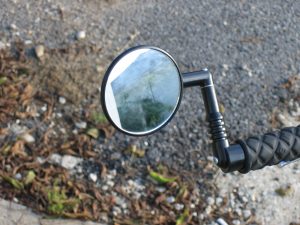 While I was in Chicago this past week for the professional technical conference some of us from Summersault were attending, we were walking to dinner one night and witnessed the driver of an SUV come within inches of hitting a cyclist. Despite the fact that the driver was rushing to turn through a yellow light, in typical big-city style, the driver of the SUV had the additional gall to yell at the cyclist to look out where she was going and then speed off. The biker was shaken up a bit but carried on fine, and we went on our way.
While I was in Chicago this past week for the professional technical conference some of us from Summersault were attending, we were walking to dinner one night and witnessed the driver of an SUV come within inches of hitting a cyclist. Despite the fact that the driver was rushing to turn through a yellow light, in typical big-city style, the driver of the SUV had the additional gall to yell at the cyclist to look out where she was going and then speed off. The biker was shaken up a bit but carried on fine, and we went on our way.
Not the most positive exchange, but at least the cyclist wasn't actually hit and hurt or killed. Yesterday marked the one year anniversary of the death of Earlham graduate Jessica Bullen after being struck by a driver in Madison, Wisconsin - her story and memorial fund are described here. Even more sadly, Jessica was a strong advocate (in a town that I consider quite biker-friendly already) for cyclists and worked to raise awareness for motorists that inattentive driving could result in a preventable injury or death. My life has been impacted in other ways by similar deaths - a good friend of my family started Fernside, a now internationally known center for grieving children, after her son was killed on his bike as a result of being struck by a car.
Continue reading "When people driving cars kill people riding bikes"

